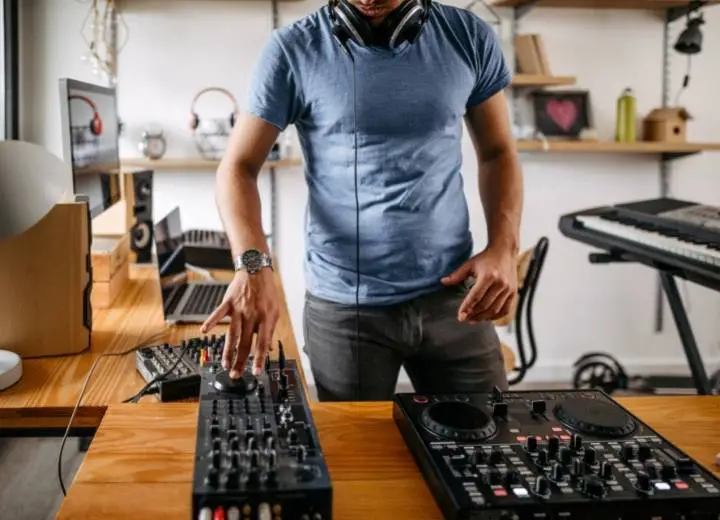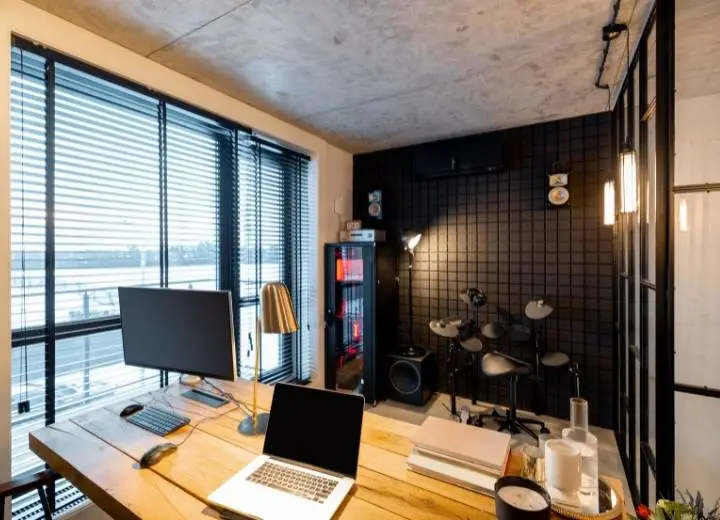
The method to keep a recording studio cool? How to keep the working environment cool but still absolutely quiet? How to cool down the recording studio without damaging the device?
These are the questions that a lot of beginners often encounter. The useful tips in our article below will give you complete answers.
#1. Change the light bulb
To keep the studio cool, you need to get rid of the heat source as much as possible. High wattage halogen bulbs are one of them.
Halogen bulbs, when lit, the temperature in tungsten is up to 131 degrees Celsius to 181 degrees Celsius. The heat source diffused into space directly affects the whole studio temperature.
Therefore, switching to LED lights is a wise suggestion. Without wasting energy by generating heat, LEDs are cooler than any light bulb. LED lamp temperature when lit ranges from 60 – 100 degrees Celsius.
It will be comfortable to light your recording studio with LEDs. The temperature is not too high, the service life is long, and the electricity is saved. That’s what LEDs are all about.
#2. Turn off unused devices
Many people are quite indifferent to the heat emitted from the devices. A regular habit when entering the studio is to turn on all the equipment even if it is not necessary.
However, the heat emanating from the boards, amplifiers, or even the computer will make the studio uncomfortable.
Therefore, turn off heat-generating devices when not in use. Using a separate water cooling fan for the computer also helps the machine work better without giving off too much heat.
#3. Close the window
Opening the window and receiving the sunlight is a work habit of many people. However, How to keep a recording studio cool while the harsh sunlight is always shining? Close the windows and use curtains.
Some types of curtains are with many layers of fabric and some special materials such as PVC, acrylic foam.
Therefore, in addition to the ability to block sunlight, the curtain can also insulate very well.
However, you should only use the radiator curtain if the room has a large window area and receives sunlight. Because of the great use, the price of insulation curtains is not low at all.
#4. Use an anti-noise fan
How to cool a recording studio? Of course, many people will choose a fan cooling method.
However, is the fan suitable for the studio? Does fan noise affect sound recording? Anti-noise fans are the answer to these questions.
Fan noise depends on many factors. The higher the fan quality, the lower the noise. Failure to maintain the fan regularly is also a cause of annoying noise.
Besides, the fan’s capacity is also a point to keep in mind when choosing a studio cooling device.
- Fan power is less than 100W, and sound intensity is less than 55dB.
- Fan power from 100 – 150 W, sound intensity from 55dB – 65dB.
- Fan power greater than 150W, sound intensity from 65dB – 70dB.
The noise level reaches 55dB, equivalent to whispering talk. Meanwhile, 65dB corresponds to normal talking. 70dB is the noise level of noisy offices, supermarkets, and streets.
When choosing to buy a fan, the data on capacity and noise level will be extremely useful. A standard noise-canceling fan will have a sound intensity of less than 55dB.
With both maximum cooling and minimal noise, noise-canceling fans are a great choice for the studio.
#5. Use the air conditioner
In tropical climates, it’s no surprise that air conditioning is the perfect solution to cooling the air. However, in temperate countries, air conditioning is somewhat of a luxury when used only a few times a year.
Therefore, it is necessary to consider many factors before choosing a method of cooling the studio with air conditioning.
Considering the cost to spend, and the air conditioner’s capacity, surely the trouble will be greatly reduced.

Will the air conditioner damage my appliance?
The air conditioner does not damage the electronics. Components are prone to problems when the air humidity is too high.
Meanwhile, the air conditioner has a strong ability to absorb moisture, causing the air to become dry. This adversely affects human health but does not have much impact on the lifespan of electronic devices.
Does the air conditioner make noise?
The air conditioner will not make any noise if it is operating in the best condition.
If the air conditioner makes a noise when operating, it is necessary to find the cause to fix it immediately quickly.
Some reasons for noise:
Improper installation of the air conditioner: The wall where the air conditioner should be solid and flat enough. If installing the air conditioner on a rough wall, it is to insert cardboard to minimize noise. Regularly check the screws to be sure to fix the position of the air conditioner.
Air conditioners have not been maintained for a long time, causing dirt to accumulate, hindering air circulation. At this time, just clean the filter mesh, squirrel cage fan, the noise will be significantly reduced.
Open the door to open the air conditioner: In this case, it is to replace the open door with a new one for the best operation of the air conditioner.
Resonance phenomenon: If the outdoor unit and indoor unit are too close together, the vibrations of both will resonate, causing the noise. Therefore, the best distance between the two parts is 2 m.
The radiator fan is broken, making an annoying noise when spinning. At this point, you need to contact the repair team to fix the problem.
Does the anti-noise fan have good cooling?
The smaller the power, the lower the noise. Therefore, the cooling capacity of the noise-canceling fan is not too impressive.
However, noise-canceling fans are still a great solution to help keep the workspace cooler.
Conclusion
Singing in a cramped, hot studio is torture. However, the question of how to keep a recording studio cool can now be aside.
Because with simple ways, cooling the recording studio is no longer a difficult task.
